- Home
- Charles de Lint
Angel of Darkness Page 2
Angel of Darkness Read online
Page 2
All that happened was that the kid’s choices narrowed. They had to walk a tightrope, scrounging for a living, every choice driving them deeper into the mire, not out of it. There weren’t many jobs on the legal side of the law for an underage kid. So they had to be found and brought home before they took a step too far. Before it was—
(too late)
Janet Rowe.
When her parents contacted him, he went looking. Not just because it was his job but because he didn’t want to read about her getting picked up for hooking or B&Es. He didn’t want to see her being pulled out of a river on the six o’clock news. He wanted her to have a chance.
What the parents didn’t know when they hired him was that he was willing to give the kid the opportunity to tell her own side of the story. If it was just too weird at home—say her old man was coming on to her, or her old lady was a lush and beating on her—he’d let her know the options she had. There were other places these kids could go, and he was willing to show them what they were. He just wanted them off the street.
Because the ones he never found were each a personal failure. They lay in wait in his mind—elusive, slightly mocking faces that could pop into his mind at any time of the day. Wanting to know why he’d let them down.
But worse were the ones he found—
(too late)
—because they wouldn’t let him sleep. They haunted his dreams. Twelve-year-old hookers. Thirteen-year-old junkies. Pale corpses, thin with malnutrition, dug out of shallow graves, floating in rivers. . . . Every city had them. The ones for whom it would always be—
(too late)
Jack rubbed his face, wishing he could forget, knowing that he never would. Not just because of the horrors he ran across, but because if he didn’t remember those kids, then who would?
Take Janet Rowe.
She already had a lot of strikes going against her. Sure, her parents had hired him to track her down. Big investment on their part. Put out a little money and then sit back and wait for someone else to clean up their mess. Because what they hadn’t told him—what he’d had to find out from her friends as he was tracking her down—was that there was a long history of abuse in the home.
The only real question in cases like this was: Why hadn’t she run away a lot sooner?
Janet’s friends hadn’t come right out and told him that her old man beat on her, or that her mother had engaged in a campaign of mental warfare against her ever since she was out of her diapers, but Jack didn’t need Janet’s friends to lay it out for him. At this point in his career he was used to reading between the lines. What he wanted now was to hear it from Janet herself. If she confirmed what he’d already intuited, there was no way she’d be going back to her parents.
Just to run away again.
And maybe get in too deep. . . .
The house loomed in Jack’s sight. He couldn’t shake the feeling that she was already in way over her head.
(too late)
Getting out of the pickup, he walked over to Chad Baker’s house. He’d known—just known—when he’d first tracked down word on the street that Janet Rowe had been seen with him that something bad was going down, but he never could have said why. After a while you got a feel for it. Standing on the porch—leaning on the bell, no answer—that earlier premonition crystallized into a sudden fear for the girl that was so sharp, it hurt his chest.
He knew then that he couldn’t go in. Not now. Not on his own. This wasn’t going to be a matter of just freeing some kid from a bad situation. This one needed cops to make sure the investigation went just right.
He left the porch, then stopped to look back at the house, the skin crawling all up and down his back. There was a sound in the air that lifted goose bumps on his arms and the hairs at the nape of his neck. He took a step back toward the house, and then he saw something that left its afterimage burned into his retinas, long after it was physically gone.
If it had ever existed.
If he hadn’t just imagined it.
A mist coming out of the side of the house, riding that faint, eerie music. A figure in the mist that had the face of an angel and the body of a showgirl, long streaming hair flowing behind her. A look in her eyes that froze the blood in his veins because there was something behind that gaze that was merciless. . . .
A fury. . . .
A sense of vertigo made him stagger and then everything he knew was gone. A vast plain lay all around him, spreading out for as far as he could see. Dead reaches of wasteland, gray and empty under a sickly sky. A salty, metallic odor stung his nostrils. That faint trace of hellish music that had heralded the angel’s arrival. . . .
The figure floated there, watching him. He wanted to run and hide from her. He wanted to embrace that showgirl body, he wanted the taste of those angel lips on his own. . . .
Slowly the city came back around him, though it still wasn’t right. Buildings and trees returned first—the houses all ruined and falling in on themselves, dark holes where the lit windows should be. The trees were bare of all vegetation. The walkway underfoot was cracked and uneven. Then the cracks began to join. Foliage appeared on the trees and hedges. Lights flared in the windows of the houses, which were no longer ruins. And there was sound again. True sound. Traffic on Bank Street, a couple of blocks over. Wind in the trees. The hum of a city’s residential area.
But that music was gone.
He wasn’t sure how long he stood there, unable to move. The figure, the wasteland—if he hadn’t just imagined them—had been gone for a while. He knew that much. Suddenly he gasped for air, lungs pumping, chest sore. He hadn’t been aware of holding his breath. Hadn’t been aware of anything except that. . . that vision. . . .
You’re losing it, Jack, he told himself.
He turned again and this time he didn’t look back, heading for his sister’s house, a block away on Harvard Avenue, to use the phone, then stopped. He couldn’t involve Anna. Not in this. Christ, she knew this Baker. Everybody in the Ottawa music scene did. He was half guru, half saint, to who knew how many of the local bands and players.
(And he had something coming out of the side of his house that looked like an angel, and she could take you to a dead place where nothing lived. . . . )
Don’t think about it, Jack told himself.
He went on to Bank Street, looking for a pay phone, and lucked out when a patrol car came by. He flagged it down and spent five wasted minutes trying to convince the uniforms that this was a serious situation. It wasn’t until he’d told them that he’d been a cop himself—worked the same field patrol that they were on right now, for Christ’s sake—that they drove back to Baker’s with him.
He said nothing about what he thought he’d seen.
Things had changed in the few minutes he was gone. There was a smell in the air now like burning plastic. The house had a dead look to it—as though it was still partially in that. . . other place. . . .
He didn’t go in. He left that to the uniforms—it was their job. He just sat down on the steps while they tried the door. Unlocked. They went in. Jack didn’t know exactly what they were going to find, but he knew it’d be bad. When the younger of the two uniforms came out and threw up in the bushes on the other side of the steps, he knew it was even worse than he’d imagined.
What did I see? he wondered as a yellow traffic cruiser pulled up.
The flashing lights strobed in his eyes, giving him a headache. He went to sit in the back of the first cruiser, slouching in his seat, fingers kneading his temples. He saw the unmarked car arrive, a pair of plainclothes get out. He knew both men, but he didn’t recognize either of them at that moment. He was remembering an angel and a wasteland.
A fury. . . .
What the hell did I see?
He wasn’t sure he ever wanted to find out. But that sense of premonition returned and he knew that he wasn’t going to be given any choice in the matter.
2
NED MEEHAN SLOWED the unmarked se
dan beside one of the blue-and-white patrol cars that blocked either end of Wendover Avenue, between Chesley and Warrington. Their rotating lights, combined with those of a yellow traffic cruiser, lent an unavoidable air of drama to the scene. He and his partner reached for their badges as a uniform approached and bent down to look into the open window of the Buick. Ned let his ID fall back into the inside breast pocket of his suit coat when he recognized the patrolman. Patrick Nichols was a constable in B Platoon—the same platoon Ned had worked on his last uniform tour.
“Figures, doesn’t it?” Nichols said to the detectives. “Ten minutes to go on the shift and something like this comes up.”
Ned’s partner, Ernie Grier, leaned across him from the passenger’s seat to talk to the uniform.
“How’s it look, Pat?”
“Messy. We’re going to be here all night.”
Grier settled back into his seat. “And you said it was going to be a quiet shift,” he complained to Ned.
The uniform stepped aside. Ned shifted into first and eased the Buick ahead. Pulling up to the curb, he shut off the engine. Before getting out, the two detectives sat and looked at the house from which the call had originated. A possible 10-11 was the first they’d heard of it back at the station—the catch-all code that ranged from an assault to any kind of a disturbance. Scratch the possible, Ned thought, remembering the uniform’s comment.
The house was an attractive two-story brick bungalow, the first house but one from Warrington Drive, on the east side of Wendover. Beyond Warrington, the Rideau River moved slowly, its brownish waters glinting from the lights. The area was part of Ottawa South, a residential area that usually called in nothing more serious than a B&E. Ned knew the neighborhood well. He’d driven it while on field patrol, and he had friends living just one block over on Harvard Avenue.
Getting out of the car, he joined his partner on the pavement. At six-one and a hundred and eighty pounds, he seemed hefty only when he wasn’t standing next to Grier, who topped him by two inches and weighed in at an extra thirty pounds, none of it flab. Both men had short-cropped hair and mustaches.
“Why do I get the feeling we’re going to regret catching this call?” Grier asked. He shook a low-tar cigarette out of its pack— his one concession to the dangers of his one-and-a-half pack a day habit—and lit up. Blue-gray smoke haloed his face like frosty breath, but the May night was warm.
Ned just shrugged, knowing that his partner wasn’t expecting an answer. Grier was a pessimist. Even in a city as quiet as the nation’s capital, he always expected the worst on every call.
“It’s not like I can’t use the overtime,” Grier went on as they started up the walk to the front porch where another uniform waited for them. “Christ knows I got bills coming out of my ears. It’s just. . . messy, Nichols says. I don’t need messy. I go home after one of these and I look at my kid, but I don’t see him. All I can see is the blood. I mean, who needs it?”
Ned knew the uniform’s face, but he couldn’t put a name to it. “Meehan and Grier,” he said to him. “We caught the call.”
The uniform’s face looked washed out, even taking into account the bright porch light. That, Ned thought, didn’t bode at all well for whatever was waiting for them inside. Messy Ernie was right. Who needed it? He wondered about the sharp smell in the air. It was like burned rubber or plastic.
“You okay?” Ned asked. The uniform was young. It was probably his first bad one.
“I . . . I’m getting there.”
“We’ll take you through it quick,” Ned said. Grier fished out his duty book and pen to make notes. “What’s your name?”
“Ron Coffey.” Grier squinted for a moment at the man’s badge, then took down its number.
“Were you and Nichols the first on the scene?” Ned asked.
Coffey nodded. “We were flagged down by a civilian on Bank Street at eleven forty-six. We called in our position, made a quick recon, then had Dispatch send you down.”
“You got a body in there?”
Coffey’s face went pastier in the bright light. An approaching siren heralded the arrival of an ambulance from the General Hospital.
“Are you okay?” Ned asked again.
Coffey took a deep breath, then gave a quick nod. “There’s a couple of bodies—at least what’s left of them.”
Ned let that one pass, though he didn’t miss the I-told-you-so look that his partner shot him. “What about the guy who flagged you down?” Ned went on. “Where’s he?”
“In the patrol car.”
Coffey made a quick motion with his chin to where one of the older blue-and-white models was parked, blocking off the other end of Wendover where it met Warrington. The detectives glanced in its direction. In the light thrown from the ambulance’s headlights, they could easily make out the features of the man slouched in the backseat of the blue-and-white.
“Shit,” Ned said.
“You know him?” Grier asked.
“It’s Jack.”
Jack Keller had been Ned’s partner for two years, before Jack quit the force and Ned was teamed up with Grier.
“You want to go talk to him?” Grier asked.
Ned shook his head. “He can wait. Let’s go inside.” As he turned back to the door he noticed a small white card beside the doorbell that read BAKER STUDIO. “What’s that?” he asked Coffey.
“Guy who owned the place had some kind of a recording studio in the basement.”
“Anybody inside right now?”
“Constables Dwyer and Paige.”
Ned nodded to himself. That was good. Benny Dwyer was a fourteen-year veteran. He didn’t know Paige, so he assumed that the yellow traffic cruiser was his.
“You don’t have to come in,” he told Coffey. The man looked relieved. “Just keep the medics out until we ask for them and put in a call to Dispatch. We need”—he began to tick the items off on his fingers—”the area sealed off. We need a coroner— whoever’s on call. We need Inspector Fournier down here. If he’s already gone off duty, then we need—” He looked at his partner.
“Ryerson,” Grier offered.
“We’ll need Inspector Ryerson down here,” Ned continued. “Get the ID unit. . . .” He gave Coffey a quick smile. “Well, you know the drill.” When Coffey left the porch to put in the call, he turned to his partner. “Ready?”
“No.”
“Then let’s go.”
They moved down a short hallway. The smell of burned plastic was stronger inside. A living room led off to the left. On the right was what looked like an office. It had a large desk with a chair behind it, another pair in front of the desk, a wall of bookshelves. There appeared to be some diplomas on another wall. A half-dozen or so framed gold records. A third uniform met them in the kitchen.
“Constable Paige?” Ned asked.
He looked to be in better shape than Coffey but still a little queasy.
“Meehan and Grier,” Ned said when the patrolman nodded. “Where’s Benny?”
“Downstairs with the body. Listen, you’d better steel yourself. It’s not pretty.”
“Time we found out for ourselves,” Ned said.
But there was no way they could have prepared themselves for what they found below.
3
GIRLS’ NIGHT OUT.
Anna liked the Rainbow. The dance floor was small, and when the band was good, it could get crowded, but it was the right kind of crowded. Everybody jostling and having a good time, moving to the music. Too bad Beth was working tonight, she thought as the band kicked into an old Motown number, “Mr. Big Stuff.”
The Midnight Hour was one of her favorite bands—partly because she knew them personally but mostly because they were just so good. They were a five-piece—sax, guitar, bass, drums, and keyboards—fronted by Lisa da Costa, whose voice ranged anywhere from a husky growl to a pure soprano, depending on the song. Anna and Lisa used to live together until Lisa fell in love with a sax player and moved in with him, w
hich left Anna looking for a new housemate. But then she’d found Beth....
“I’m beat,” Janice moaned when the song came to an end.
It was just the three of them out on the town tonight—Janice, Cathy, and Anna. Janice leaned heavily against Anna, five feet four inches of exaggerated limp muscles. Her brown hair was cut fashionably short, giving her a perky look.
Anna grinned. “Too bad. Someone’s had his eye on you all night—just waiting to get up the nerve to ask you for a dance, if you ask me.”
“Where?”
“Over by the bar—the tall guy in the jean jacket.”
“Dreamy,” Cathy said, giving him a quick glance.
“Knowing my luck,” Janice said, “he’ll be gay.”
“Want me to find out?” Anna asked.
“Don’t you dare.”
The band started up a slow version of “Love Potion No. 9.”
“Here’s our cue to bow out,” Cathy said.
She gave Anna’s arm a quick tug, and the two of them were off the dance floor before Janice caught on to what they were up to. She moved to catch up to them, but the man by the bar was suddenly in front of her.
“Dance?” he asked.
Janice gave her companions a quick shrug, then smiled at the stranger. “Sure. What’s your name?”
“Dave. What’s yours?”
Anna and Cathy returned to their table on the edge of the dance floor and watched the pair dance. Janice had a happy look on her face, and Anna had to agree with Cathy about the stranger. He was dreamy. He and Janice worked their way closer to the stage, slow dancing. Checking each other out, or at least as much as they could over the sound of the band.
“So much for our girls’ night out,” Cathy said as she topped her glass with more beer. She leaned forward, pulling her long red hair free from behind her back and the chair. She wore it in a ponytail tonight.

 Widdershins
Widdershins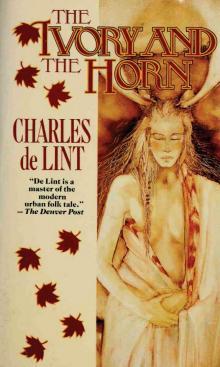 The Ivory and the Horn
The Ivory and the Horn Yarrow
Yarrow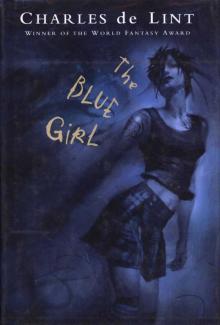 The Blue Girl
The Blue Girl Spirits in the Wires
Spirits in the Wires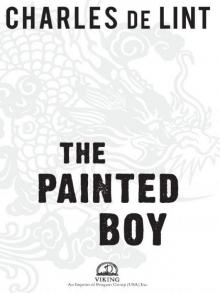 The Painted Boy
The Painted Boy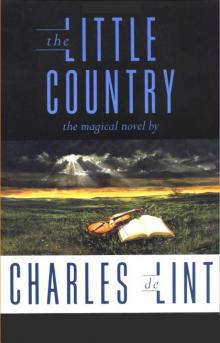 The Little Country
The Little Country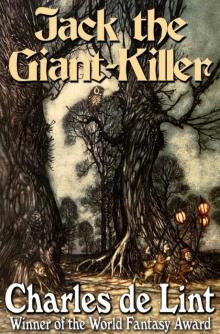 Jack of Kinrowan: Jack the Giant-Killer / Drink Down the Moon
Jack of Kinrowan: Jack the Giant-Killer / Drink Down the Moon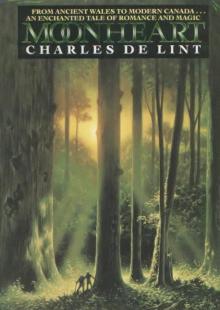 Moonheart
Moonheart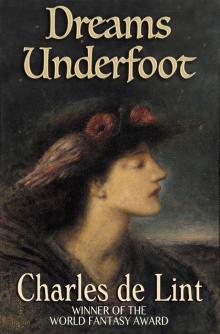 Dreams Underfoot
Dreams Underfoot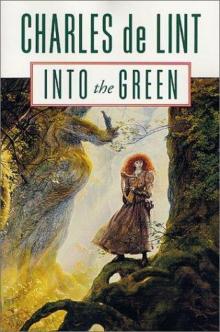 Into the Green
Into the Green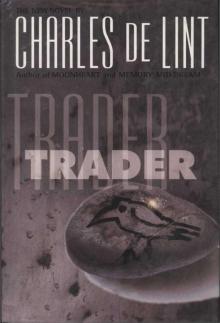 Trader
Trader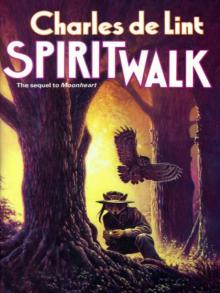 Spiritwalk
Spiritwalk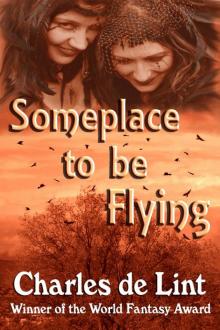 Someplace to Be Flying
Someplace to Be Flying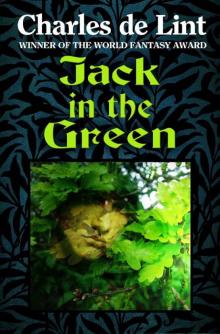 Jack in the Green
Jack in the Green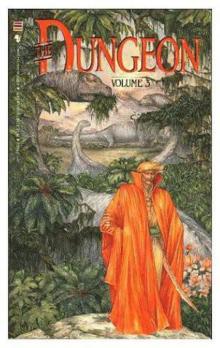 The Valley of Thunder
The Valley of Thunder Out of This World
Out of This World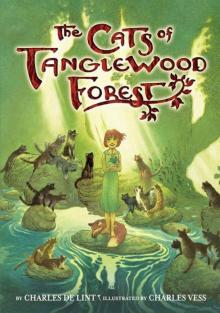 The Cats of Tanglewood Forest
The Cats of Tanglewood Forest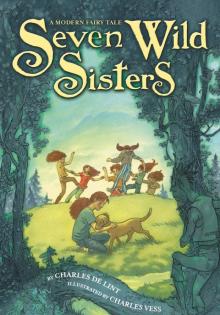 Seven Wild Sisters
Seven Wild Sisters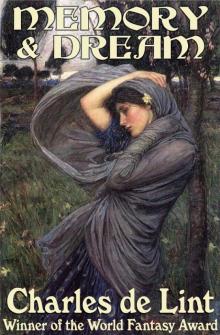 Memory and Dream
Memory and Dream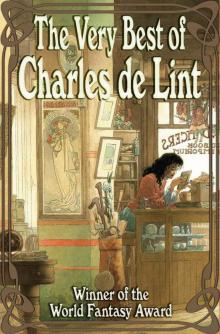 The Very Best of Charles De Lint
The Very Best of Charles De Lint Under My Skin
Under My Skin Forests of the Heart
Forests of the Heart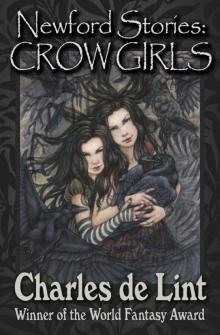 The Newford Stories
The Newford Stories Moonlight and Vines
Moonlight and Vines Angel of Darkness
Angel of Darkness The Onion Girl
The Onion Girl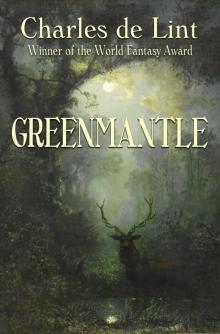 Greenmantle
Greenmantle Waifs And Strays
Waifs And Strays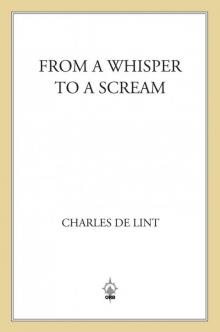 From a Whisper to a Scream
From a Whisper to a Scream Over My Head
Over My Head The Ivory and the Horn n-6
The Ivory and the Horn n-6 Our Lady of the Harbour
Our Lady of the Harbour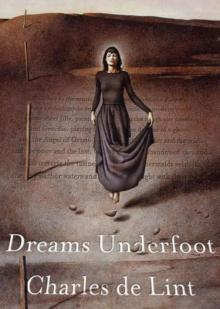 Dreams Underfoot n-1
Dreams Underfoot n-1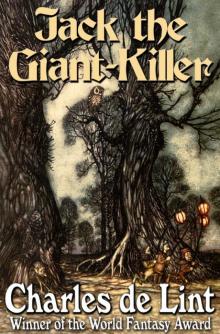 Jack the Giant-Killer (Jack of Kinrowan Book 1)
Jack the Giant-Killer (Jack of Kinrowan Book 1)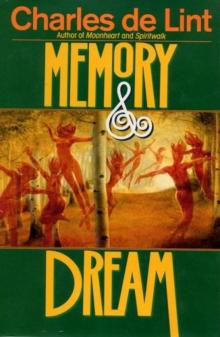 Memory and Dream n-5
Memory and Dream n-5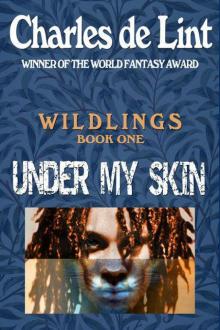 Under My Skin (Wildlings)
Under My Skin (Wildlings)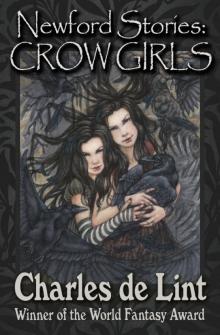 Newford Stories
Newford Stories The Wind in His Heart
The Wind in His Heart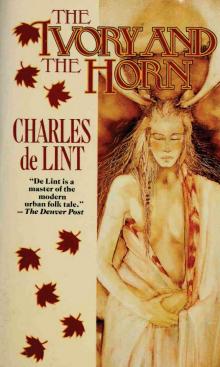 Ivory and the Horn
Ivory and the Horn